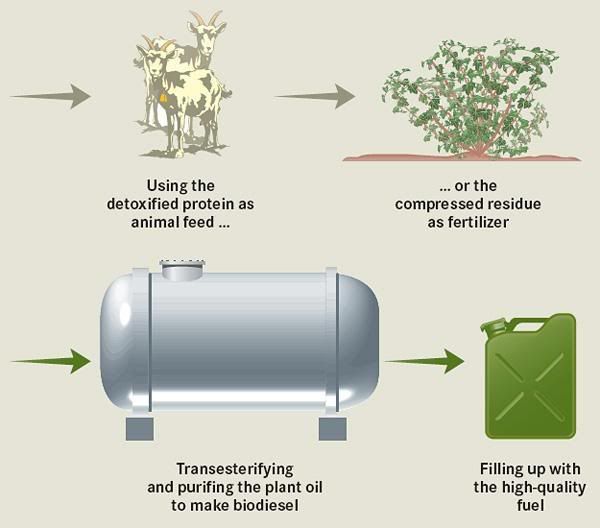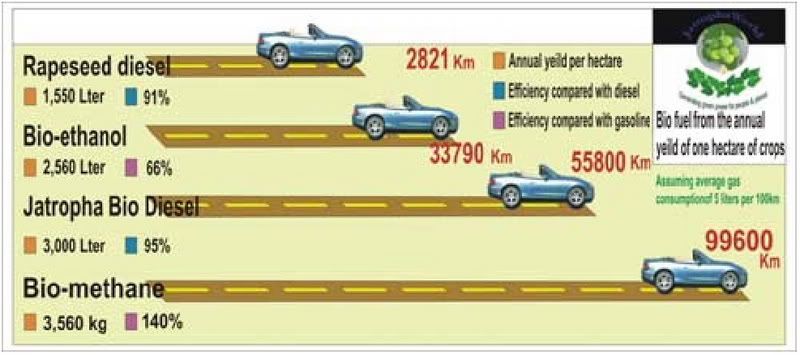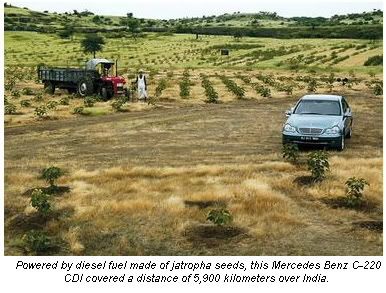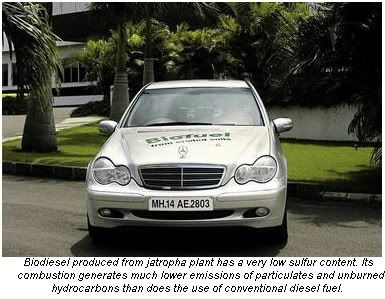Results 1 to 10 of 27
-
February 8th, 2008 05:04 PM #1[SIZE=3][SIZE=4]BE AN INVESTOR IN THE EMERGING BIOFUEL INDUSTRY[/SIZE]
[SIZE=3](At an affordable and easy way!)[/SIZE]
With the signing of RA 9367 : The Biofuels Act of 2006 mandating the use of 5% blend of biofuel with fossil fuels and a raise to 10% by 2011, the continuing oil price hike and shortage and the growing concerns on global warming, there have been a sudden influx of foreign investors coming here in the Philippines to put up billion dollar investments in the cultivation and processing of jatropha tree which is the best source of biofuel.
Such turn of events only shows how viable, profitable and marketable the biofuel industry is and that the demand is very high as compared to present supply right now. These investors have envisioned it, studied it, done it, improved it and are now expanding here in our country. As BizNewsAsia tagged it, the jatropha tree is the next super fuel where it will be the biodiesel fuel and petrochem base of the 21st century.
But are we just going to let those foreign investors lord it over this new industry? Are we just limited to being spectators and workhorses in this field of business?
Now you can be players in the sunrise biofuel industry! Here is you’re opportunity of a lifetime to invest in the emerging biofuel industry while helping stop global warming. Yes, money and energy can grow on trees!!!
This "Jatropha biodiesel” is going to happen. We know there are a lot of farmers, entrepreneurs, and investors reading this who can cash in on this biodiesel craze. They are already doing it big time in Europe so it's just a matter of time before it happen worldwide using Jatropha to make biodiesel.
This industry is going to grow very quickly so start planting Jatropha TODAY and then start making biodiesel to produce/ generate your own fuel/electricity/power.
For more details about the investment, you may email me at brsece*yahoo.com
Or visit us at http://www.bioenergyfarms.net
Let’s sit down, talk business and start building you investment portfolio and your future.[/SIZE]
-
February 8th, 2008 05:11 PM #2[SIZE=3]WISE AND SAFE INVESTMENT FOR EVERY BUSINESSMAN AND ENTREPRENEUR OR EVEN FOR A SIMPLE EMPLOYEE! [/SIZE]
[SIZE=2]Investing in the Bio fuel Industry is like investing in Makati and Ortigas Real Estate, when its price was still at ONE PESO per Square Meter. [/SIZE]
[SIZE=2]People back then, thought that the businessmen who bought land there was just too damn crazy, they don't know what to do with their money anymore. But look at them now, who do you think is mooore craaaaaazy? Ortigas and Makati Land, nowadays costs more than a 150,000 (Thousand) Pesos per square meter? [/SIZE]
[SIZE=2]Same as with BioEnergy and the BioFuel Industry. People might laugh at us, the same way those ortigas and makati guys in the 70's did, because we sell shares of a young company. (But actually, buying shares of a young, well-planned company is a wise thing to do because we all know that the prices of the shares of that company will soon take off and will be a good asset.) [/SIZE]
[SIZE=2]As for the Bio Fuel Investment, Daemler-Benz (the Producer/Owner of Mercedes Benz), has actually been successful, running their slightly modified car (MB C220 CDI) with a 100% Biofuel in it.[/SIZE]
[SIZE=2]The project was done on 2004, where everyone dont know the value of jatropha. UK and India pioneered in the research and development of jatropha and now they are the reaping the seeds of their investments.[/SIZE]
[SIZE=2]Invest in to something tangible. Something that your future would thank you and the generation after you, for being wise in grabbing your life's opportunity.[/SIZE]
-
February 8th, 2008 05:18 PM #3
[SIZE=3][SIZE=4]The Next Generation Sustainable Fuel[/SIZE] [/SIZE]
[SIZE=3][/SIZE]
[SIZE=3]What is Bio Diesel?[/SIZE]
The concept dates back to 1885 when Dr. Rudolf Diesel built the first diesel engine with the full intention of running it on vegetative source.
He first displayed his engine at the Paris show of 1900 and astounded everyone when he ran the patented engine on any hydrocarbon fuel available - which included gasoline and peanut oil. In 1912 he stated " … the use of vegetable oils for engine fuels may seem insignificant today. But such oils may in the course of time become as important as petroleum and the coal tar products of present time."
Scientists discovered that the viscosity ( thicKness) of vegetable oils could be reduced in a simple chemical process In 1970 and that it could work well as diesel fuel in modern engine.
This fuel is called Bio- Diesel.
Since then the technical developments have largely been completed. Plant oil is highly valued as Bio fuel "Diesel" and transformed into Bio Diesel in most industrialised
Please note!!!
This vegetable oil can be used as it is crushed – ie - unrefined in the engines of cars
This vegetable oil can be blended with normal diesel and used in cars.
This vegetable oil can be refined and sold as pure diesel
Refined it can be exported as a clean fuel to anywhere in the world.
Bio Diesel is asubstitute for, or an additive to, diesel fuel that is derived from the oils and fats of plants, like Sunflower, Canola or Jatropha.
It is an alternative fuel that can be used in diesel engines and provides power similar to conventional diesel fuel.
Bio Diesel is arenewable domestically produced liquid fuel that can help reduce the countries dependence on foreign oil imports.
Recent environmental and economic concerns (Kyoto Protocol) have prompted resurgence in the use of biodiesel throughout the world. In 1991, the European Community, (EC) Proposed a 90% tax reduction for the use of biofuels, including biodiesel.
Today, 21 countries worldwide, produce Biodiesel.
[SIZE=3]The Advantages of Bio Diesel[/SIZE]
Bio Diesel is the most valuable form of renewable energy that can be used directly in any existing, unmodified diesel engine.
Energy Independence: Considering that oil priced at $60 per barrel has had a disproportionate impact on the poorest countries, 38 of which are net importers and 25 of Which import all of their oil; the question of trying to achieve greater energy independence one day through the development of biofuels has become one of ‘when’ rather than ‘if,’ and, now on a near daily basis, a biofuels programme is being launched somewhere in the developing world.
Smaller Trade Deficit: Rather than importing other countries’ ancient natural resources, we could be using our own living resources to power our development and enhance our economies. Instead of looking to the Mideast for oil, the world could look to the tropics for biofuels. producing more biofuels will save foreign exchange and reduce energy expenditures and allow developing countries to put more of their resources into health, education and other services for their neediest citizens.
Economic Growth: Biofuels create new markets for agricultural products and stimulate rural development because biofuels are generated from crops; they hold enormous potential for farmers. In the near future—especially for the two-thirds of the people in the developing world who derive their incomes from agriculture.
Today, many of these farmers are too small to compete in the global market, especially with the playing field tilted against them through trade distorting agricultural subsidies. They are mostly subsistence farmers who, in a good year, produce enough to feed their families, and in a bad year, grow even poorer or starve. But biofuels have enormous potential to change this situation for the better.
At the community level, farmers that produce dedicated energy crops can grow their incomes and grow their own supply of affordable and reliable energy.
At the national level, producing more biofuels will generate new industries, new technologies, new jobs and new markets.
Cleaner Air: Biofuels burn more cleanly than gasoline and diesel. Using biofuels means producing fewer emissions of carbon monoxide, particulates, and toxic chemicals that cause smog, aggravate respiratory and heart disease, and contribute to thousands of premature deaths each year.
Less Global Warming: Biofuels contain carbon that was taken out of the atmosphere by plants and trees as they grew. The Fossil fuels are adding huge amounts of stored carbon dioxide (CO2) to the atmosphere, where it traps the Earth's heat like a heavy blanket and causes the world to warm. Studies show that biodiesel reduces CO2 emissions to a considerable extent and in some cases all most nearly to zero.
[SIZE=3]In Nut-shell:[/SIZE]
.:.Bio Diesel is the most valuable form of renewable energy that can be used directly in any existing, unmodified diesel engine.
.:.Bio Diesel fuel and can be produced from oilseed plants such as rape seeds, sunflower, canola and or JATROPHA CURCAS.
.:.Bio Diesel is environmental friendly and ideal for heavily polluted cities.
.:.Bio Diesel is as biodegradable as salt
.:.Bio Diesel produces 80% less carbon dioxide and 100% less sulfur dioxide emissions. It provides a 90% reduction in cancer risks.
.:.Bio Diesel can be used alone or mixed in any ratio with mineral oil diesel fuel. The preferred ratio if mixture ranges between 5 and 20% (B5 - B20)
.:.Bio Diesel extends the live of diesel engines
.:.Bio Diesel is cheaper than mineral oil diesel
.:.Bio Diesel is conserving natural resources
[SIZE=3]The Process[/SIZE]
The process of converting vegetable oil into biodiesel fuel is called Transesterification and is luckily less complex then it sounds.
Chemically, Transesterification means taking a triglyceride molecule, or a complex fatty acid, neutralizing the free fatty acids, removing the glycerin, and creating an alcohol ester. This is accomplished by mixing methanol with sodium hydroxide to make sodium methoxide. This liquid is then mixed into the vegetable oil. After the mixture has settled, Glycerin is left on the bottom and methyl esters, or biodiesel is left on top and is washed and filtered.
The final product Bio Diesel fuel, when used directly in a Diesel Engine will burn up to 75% cleaner then mineral oil Diesel fuel.
[SIZE=3]International Laws and regulation[/SIZE]
Several countries have active Biodiesel programmes. Such countries also have given legislative support and have drawn up national polices on biodiesel development. Wide variety of motives for action taken can observe like
.:.Increase of energy supply security
.:.Reduction of dependence on fossil energy forms
.:.Reduction of harmful locally acting emissions.
.:.Protection of soil by biodegradable products
.:.Reduction of health hazard by using non-toxic products.
for more info you may pm and visit us in:
BioEnergy Farm Development Corporation
The Management Arm of BioEnergy Farms MPC
Suite 1609 Medical Plaza Ortigas, San Miguel Avenue
Ortigas Center, Pasig City, Philippines 1600.
-
February 8th, 2008 05:24 PM #4
[SIZE=4]JATROPHA - A NEW ENERGY CROP[/SIZE]
Jatropha curcas has the potential to become one of the world's key energy crops. Crude vegetable oil, extracted from the seeds of the jatropha plant, can be refined into high quality biodiesel.
Under optimum conditions jatropha seeds can yield up to 40% oil content. Crude jatropha oil is inedible and its price is not distorted by competing food uses.
Jatropha grows in tropical and subtropical regions in a band around the earth between latitudes 30 degrees north and south of the Equator. Jatropha is hardy and relatively drought resistant. Trees have a lifespan of up to 30 years. Jatropha grows on a wide range of land types, including non-arable, marginal and waste land, and need not compete with vital food crops for good agricultural land.
Seeds are crushed to produce oil for refining into biodiesel. The residual meal (seedcake) left after oil extraction is excellent organic fertiliser and can be burnt for power generation. If the compounds that make jatropha inedible can be removed, jatropha meal has the potential to be a valuable animal feed. Efficient use of byproducts ensures that jatropha growing and processing is economically viable and energy efficient.



-
February 8th, 2008 06:24 PM #5
[SIZE=3][SIZE=4]DEPARTMENT OF ENERGY[/SIZE]
[SIZE=3]Deaprtment Circular No. DC 2007-05-006[/SIZE][/SIZE]
[SIZE=3]RULES AND REGULATIONS IMPLEMENTING REPUBLIC ACT NO. 9367 (BIOFUELS ACT OF 2006)[/SIZE]
[SIZE=3][SIZE=4]Section 5. Mandatory Use of Biofuels[/SIZE][/SIZE]
[SIZE=3]Pursuant to section 5 of the Act, all liquid fuels for motors and engines sold in the Philippines shall contain locally-sourced biofuels components as follows:[/SIZE]
[SIZE=3]5.2. Biodiesel[/SIZE]
[SIZE=3]a. Within three (3) months from the effectivity of the Act, a minimum of 0ne (1%) biodiesel by volume shall be blended into all diesel fuels sold in the country. Provided, that the biodiesel blend conforms to the PNS.[/SIZE]
[SIZE=3]b. Within two (2) years from the effectivity of the Act, the NBB is empowered to determine the feasibility and therefore recommend to DOE to mandate a minimum of two percent (2%) blend of biodiesel by volume which may be increased after taking into account considerations including, but not limited to, domestic supply and availability of locally-sourced biodiesel component.[/SIZE]
[SIZE=3][SIZE=4]Section 7. Incentives under the Act.[/SIZE][/SIZE]
[SIZE=3]7.1. To encourage investments in the production, distribution, and use of locally produced biofuels at and above minimum mandated blends, and without prejudice to enjoying applicable incentives and benefits under existing laws, rules, regulations, the following additional incentives are hereby provided:[/SIZE]
[SIZE=3]a) Specific Tax. The specific tax on local or imported biofuels component of the blend per liter of volume shall be zero. For the purpose of availing a zero specific tax, local or imported bioethanol shall be suitably denatured into bioethanol fuel in accordance with existing revenue regulations. The gasoline and diesel fuel component shall remain subject to prevailing specific tax rates.[/SIZE]
[SIZE=3]b) Value Added Tax. The sale of raw material used in the production of biofuels such as, but not limited to, coconut, jatropha, sugarcane, cassava, corn, and sweet sorghum shall be exempt from the value added tax.[/SIZE]
[SIZE=3]The tax incentives provided under items (a) and (b) of this Section shall be subject to rules and regulations to be promulgated by the DOF.[/SIZE]
[SIZE=3]c) Water Effluents. All water effluents, such as but not limited to distillery slops from the production of biofuels used as liquid fertilizer and for other agricultural purposes are considered “reuse” and are therefore, exempt from wastewater charges under the system provided under Section 13 of RA 9275, also known as the Philippine Clean Water Act; Provided, however, that such applications shall be in accordance with the guidelines issued pursuant to RA 9275, subject to the monitoring and evaluation by the DENR and approved by the DA; and[/SIZE]
[SIZE=3]d) Financial Assistance. Government financial institutions, such as the Development Bank of the Philippines, Land Bank of the Philippines, Quedancro, and other government institutions providing financial services shall, in accordance with and to the extent allowed by the enabling provisions of their respective charters or applicable laws, accord high priority to extend financing to Filipino Citizens or Entities, at least sixty per cent (60%) of the capital stock of which belongs to citizens of the Philippines that shall engage in activities involving production, storage, handling, and transport of biofuel and biofuel feedstock, including blending of biofuels with petroleum, as certified by DOE.[/SIZE]
[SIZE=3]7.2. The appropriate government agencies shall issue the necessary guidelines for the availment of such incentives.[/SIZE]
[SIZE=3][SIZE=4]Rule 5. Role of the Players in the Biofuel Industry[/SIZE][/SIZE]
[SIZE=3]Section 22. Oil Companies.[/SIZE]
[SIZE=3]22.1. Blending of Biofuels. Blending of biodiesel and bioethanol with diesel and gasoline fuels, respectively, shall be undertaken by the oil companies using appropriate blending methodologies at their respective refineries, depots or blending facilities prior to the sale of biofuel-blends to consumer / end-users. Provided, that blending methodologies shall be in accordance with duly accepted international standards as well as guidelines issued by the DOE for this purpose: Provided further, that oil companies shall ensure compliance of the biofuel blends with the PNS.[/SIZE]
[SIZE=3]22.2. Supply and Distribution. To ensure compliance of the minimum mandated biofuel blends with the PNS, oil companies shall observe the following guidelines, in addition to thwat may be prescribed by the DOE under subsequent issuances:[/SIZE]
[SIZE=3]a) Supply of biofuels shall be sourced only from biofuel producers accredited by the DOE. The procurement of biofuels may be covered by biofuels supply contracts or agreements;[/SIZE]
[SIZE=3]b) Ensure proper logistics and application of appropriate technologies in blending, handling, transporting, and distributing biofuel-blends; and[/SIZE]
[SIZE=3]c) Observe proper diligence in the supervision of company-operated, dealer-owned or dealer-operated retail service stations carrying their brand in order to ensure that the quality and integrity of PNS-compliant biofuels shall be maintained.[/SIZE]
[SIZE=3]22.3. Supply shortage. In the event of supply shortage of locally produced bioethanol during the first four-year period from the effectivity of the Act, oil companies may apply for the issuance of a certification to import bioethanol from the DOE in accordance with existing guidelines.[/SIZE]
[SIZE=3]22.4. Reportorial Requirements. For proper monitoring of the compliance by oil companies with this IRR, each oil company shall submit to the DOE the following reports:[/SIZE]
[SIZE=3]a. Performance Compliance Report. Every oil company shall submit on an annual basis a Performance Compliance Report containing its compliance plan with the minimum mandated biofuel blends as well as other information that may be required by the DOE. Such report shall be duly certified and signed under oath by an authorized responsible officer of the oil company who shall personally attest to the veracity and accuracy of its contents.[/SIZE]
[SIZE=3]b. Periodic Reports. The oil companies shall likewise submit periodic reports as may be required by DOE.[/SIZE]
-
February 8th, 2008 06:36 PM #6[SIZE=3]
 [/SIZE]
[/SIZE]
[SIZE=3]Bio Energy Group of Companies is a corporation and cooperative group formed in 2007 to implement a multi-billion peso 10- year national Fuel and Food Forest Farming (F4 ) Program with mass based participation throught the innovative cooperative FARM-SHARE ownership model.[/SIZE]
[SIZE=3]Every FARM SHARE ownership will be sub-divided in to(FSU)Farm share units that provides every owner a pro-rated share in profit or patronage refund of the following :[/SIZE]
[SIZE=3]1.COLLECTIVE FARMING [/SIZE]
[SIZE=3]From Jatropha ,Mango ,Moringa(Malunggay) and other herbs.[/SIZE]
[SIZE=3]2.CONTRACT MANUFACTURING [/SIZE]
[SIZE=3]Product outputs Biofuel, glycerin, powdered moringga etc.[/SIZE]
[SIZE=3]3.MICRO-CREDIT PROGRAM [/SIZE]
[SIZE=3]Training and capacity building and livelihood program.[/SIZE]
[SIZE=3]4.FARM SHARE REFFERAL PROGRAM [/SIZE]
[SIZE=3]Member get member incentive program.[/SIZE]
[SIZE=3]5.CONSUMER PRODUCTS [/SIZE]
[SIZE=3]Patronage refund from use or sale of consumer products (i.e. CervoMax, etc)[/SIZE]
[SIZE=3]6. CDM CARBON CREDITS [/SIZE]
[SIZE=3]Very Soon ![/SIZE]
[SIZE=3][SIZE=4]FARM SHARE OWNERSHIP[/SIZE][/SIZE]
[SIZE=3]Farm share ownership starts at 1 farm share unit to as many farm share units an investor wants or can afford. Every One (1) Farm Share Unit (FSU) is worth P30,000.[/SIZE]
[SIZE=3]Easy Ownership Plan: Pioneering Promo[/SIZE]
[SIZE=3]A. Spot Cash Payment : For spot cash payments, we have a limited offer of 10% discount which means you will only have to pay P27,000 for 1 FSU.[/SIZE]
[SIZE=3]B. Easy Installment Plan: Minimum Downpayment of P4,800 and remaining balance payable in 36 months with PRE-APPROVED IN-HOUSE FINANCING and ZERO INTEREST RATE (P700/month for 36months)[/SIZE]
[SIZE=3](Waiver of installment in case of death or disability)[/SIZE]
[SIZE=3][SIZE=4]COMPANIES ARE WELCOME TO ADAPT OUR PROGRAM AS THEIR CSR PROJECT![/SIZE][/SIZE]
[SIZE=3]See guys, your small investment can really get you BIGGER dividends as compared to any traditional business out there! [/SIZE]
[SIZE=3]There are so many possibilities to earn money in this business.....[/SIZE]
[SIZE=3]and I wouldn't want to be left out on this one if I were you![/SIZE]
[SIZE=3]INVEST NOW AND REAP YOUR REWARDS AND EARNINGS SOONER THAN LATER!!![/SIZE]
-
February 8th, 2008 06:43 PM #7[SIZE=3]
 [/SIZE]
[/SIZE]
[SIZE=3][SIZE=4]BIOENERGY FARM SHARES 4-IN-1 INVESTMENT PLAN:[/SIZE][/SIZE]
[SIZE=3]1. Share in the Future of BioFuel Energy. Pioneer in the raw BioFuel industry! In Energy farming, oil and money can grow on trees. Oil from Jatropha seeds are easily processed using our Trans-esterification process. [/SIZE]
[SIZE=3]2. Share in the Profits of the Integrated F4 Program. By owning Farm Shares, you own pro-rate profits from the 125,000 Jatropha Energy Trees, 5,000 Mango Trees and 5,000 Moringa Trees planted in every BioEnergy Farm under the Fuel and Food Forest Farming Program. Enjoy the fruits of managed farming – without the hard labor! [/SIZE]
[SIZE=3]3. Share in Land Value. Each Farm Share Unit (FSU) gives you pro-rated ownership of a 50-hectare BioEnergy Farm, to be planted with at least 135,000 high yield trees. Why profit only on the trees? Share in land value appreciation too! [/SIZE]
[SIZE=3]4. Share in Cooperative Wealth. Each Farm Share Unit (FSU) = 300 shares in BioEnrgy Farms Multi-Purpose Cooperative which projects dividends of 20-40% annually after full operationalization.[/SIZE]
[SIZE=3][SIZE=4]IN OWNING FARM SHARES, YOU ALSO…[/SIZE][/SIZE]
[SIZE=3]A. Help stop global warming. Every Farm Share is part of our Strategic Carbon Offset Program to plant 100 million trees in 10 years, absorbing billions of kilos of CO2 and other harmful Greenhouse Gas over 50 years.[/SIZE]
[SIZE=3]B. Help people in the countryside. Farm Shares creates jobs and non-polluting rural economic development.[/SIZE]
[SIZE=3]C. Help the national economy. Buying Farm Shares helps save dollars used to buy dirty fossil fuel. Our F4 program instead produces exportable fruits and biofuel – a potential dollar revenue earner.[/SIZE]
[SIZE=3][SIZE=4]WHY IS IT A GOOD LONG TERM INVESTMENT?[/SIZE][/SIZE]
[SIZE=3]1. Safe investment backed by land (real property) and trees are insured.[/SIZE]
[SIZE=3]2. Invested in the sunrise BioFuel industry. The market demand is very high as compared to the present supply. [/SIZE]
[SIZE=3]3. An Income-Generating Asset with higher potential profit yield as compared to traditional passive investments.[/SIZE]
[SIZE=3]4. An Appreciating Asset (backed by lifetime increase in land value) that is fully transferable to heirs.[/SIZE]
[SIZE=3]5. Secured by shares with cooperative voting rights.[/SIZE]
6. Lifetime rights of income and ownership.
-
February 8th, 2008 06:50 PM #8[SIZE=4]THE TIME TO ACT IS NOW BEFORE AFFORDABLE OIL BECOMES A DISTANT MEMORY![/SIZE]
[SIZE=3]“And Geronimo Velasco, first energy minister, the very same person who led the development of the entire geothermal energy program, wrote these words, and I quote, “the crisis made us realize that the world’s oil supply had become so volatile that dependence on oil imports was no longer a reliable option to fuel the country. If we were to make progress, we had to develop our own energy sources.” We knew this 35 years ago. Where are we today?”[/SIZE]
- Jose Ma. Lorenzo Tan, Vice-Chairman, WWF Phil
Capitalizing On A Renewable Present, 2008 Philippine Energy Summit.
-
February 9th, 2008 09:40 AM #9
Tanong lang po...
why use this method in raising capital?
Selling "farm shares" to the public?
Why not just go get listed on the PSE? Mag-IPO nalang...
or why not just go to the banks?
From the sound of that sales pitch, wala pa ata cash flow ung company.
-
February 10th, 2008 11:59 AM #10
As a multi-purpose cooperative, we follow the notion of getting things done with a collective effort. We follow this sales pitch to keep reaching for more people and our growth may be slow but definitely scalable.
Going IPO would mean conversion to corp. status and that entails giving up several benefits enjoyed being a coop such as zero withholding tax, democratic control and voting rights, more transparent annual divident reporting and no holdover asset/profit from annual reporting. In a way we are doing IPO because we are now offering shares to the public.
While bank loan is fesible, its not entirely plausible and defeats the purpose of cooperation.
Although we strive for financial gain in our business ventures, we are also after social and environmental profit and thats why we want to expand our reach and not limit it to a certain group of investors because the more people we reach, the more people become aware and involved in our project and cause.





 Reply With Quote
Reply With Quote







Be careful with channels like "China Observer" on YouTube. There is a clear bias in their posts and...
Xiaomi E-Car